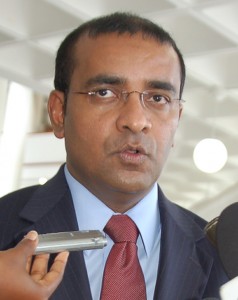–acting on it would have put them at risk
President Bharrat Jagdeo yesterday said that the unflattering information he had about retired army major, David Clarke, came from Buxtonians which prevented him from ordering the officer court-martialled as he wanted to protect the informants given the volatile situation in the community.

Even today, the President said, he is still not prepared to give up the identities of those persons as the information they relayed to him was in confidence. Clarke has been charged in the US with conspiracy to traffic in drugs and his name has been mentioned on the witness list for the Roger Khan drug cases. Questions have been raised about Clarke because he was in charge of a key Buxton security operation following the post-jail-break crime spree.
“I have made it clear about my position on Clarke because… I knew about Clarke …the information on Clarke came from people whom I know in Buxton. And I would never ever, ever betray their confidence because they told me this in confidence. And I had it. It was clear. I shared it but you had a cabal that was pushing it but of course he didn’t get to move forward. …this happens routinely, people share information,” the President told reporters during a press conference at the Office of the President.
Despite the President’s insistence that Clarke did not “get to move forward”, the former officer was in fact promoted from captain to major after the president had initially blocked his promotion; and instead of being dishonourably discharged from the Guyana Defence Force (GDF), the officer was allowed to retire.
Last week, the President revealed that he had “confidential information” that Clarke, who had led an army operation in Buxton after an upsurge in crime, was not serving the army’s best interests.
He had then said that he did not want to make the information public but he had been told that during Clarke’s tour in Buxton the officer was involved in various activities. “The information was not very complimentary,” the President had told a news briefing and he added, “I said to the authorities there in the army that I did not think that he was serving our best interests.
“I have been vindicated in all of this, because subsequently they caught him involved in activities [and] he was sent out of the army.
“And I’m sure there are some retired people, who may be seeing this press conference, who can’t look me straight in the face because he was involved.”
‘Not a Kangaroo court’
“But we have to think, when we sit here we have to think. If I was unprepared in that environment to bring the person to testify at the court martial then how successful it would have been? It is not a kangaroo court you don’t just go in there and say you are guilty and that’s the end of the matter, you have to prove it and I have just said to you that I was unprepared and onto today I am unprepared to give the names of the people because I received the information in confidence and I will keep that information in confidence; their identities. They were from the area. Given what was happening in that area I couldn’t be sure that the information would not have been leaked. In fact if that [had happened] then they would have been known so sometimes you have to think about these things,” Jagdeo said.
In 2003, Jagdeo had created a stir when he had refused Clarke’s promotion; the only one he denied from a long list of recommended officers. The then captain was recommended by a promotions panel chaired by the then army Chief of Staff, Brigadier Michael Atherly, based on the recommendation of his battalion commander.
The commander’s recommendation was said to be based on Clarke’s attitude and performance in his substantive rank, his suitability for promotion to higher rank and authority as well as his suitability for retention in the army. That assessment was reached based on the recommendation of a promotion panel at the battalion level, which reviewed the ex-officer’s annual confidential reports and assessed his suitability.
At last week’s press conference Jagdeo had explained that the Defence Act gives the Commander-in-Chief the sole authority to approve promotions. He said he was surprised to see Clarke’s name on the list for promotion.
At the time, senior army sources had told Stabroek News that nothing in the man’s record indicated that he had behaved in an inappropriate manner either during his assignment in Buxton or in the other locations at which he was stationed.
“I said to them, I am not going to promote him,” Jagdeo said last week, adding that there followed discussions at a number of levels of the army where it was felt that he should have approved the promotion. “I said ‘no.’ It came to the Defence Board but I said ‘No, he is not going to be promoted because I know that he was involved in various things from confidential information.’”
‘Hell bent on pushing Clarke’
When it was pointed out to the Head of State yesterday that although he blocked the officer’s promotion in one year he was still subsequently promoted to the rank of major, he said while he had followed up the issue in 2003 because of the information he had, he did not do so the following year.
“Yes, yes, you know these issues in that particular year I specifically, I don’t, I don’t, I hardly ever review these things because you treat them in many ways as routine, the promotions coming from the Chief of Staff but because I had specific information, I looked for him in that particular year, I looked for him.”
Pressed further on the issue the President said: “Clearly from what I have said you have to deduce that, and I am doing the deduction for you now which I shouldn’t be doing, that some people were hell bent on pushing Clarke’s interest, who should have known better, from the then leadership of the army, and it is as simple as that.”
At the time, Major General (ret’d) Michael Atherly was the Chief of Staff. Attempts by Stabroek News to obtain an interview with the former army head on the issue have proven futile.
Atherley now works closely with President Jagdeo as head of the recently established Security Sector Secretariat at the Office of the President.
As reported in the Sunday Stabroek of March 8, Clarke is in the custody of New York law enforcement officials, having been charged with conspiracy to import cocaine. He was expected to be one of the main witnesses for the US government in its prosecution of drug trafficker Roger Khan.
However, now that Khan has pleaded guilty to trafficking in narcotics and other offences, Clarke would no longer have to go into the witness box.
According to the indictment on the first charge, Clarke, his brother Hubert Clarke, called ‘Dun Dun,’ and Hubert’s girlfriend Shelly Mcqune, between October 2003 and April 5, 2005, together with others, knowingly and intentionally, conspired to import more than five kilos of cocaine into the US. They are also alleged to have conspired to distribute the cocaine in the US.
Jagdeo, who is also the Minister of Defence, had also recalled Clarke from a training course in the USA, for which the GDF had selected him. The officer was halfway through the course when he was ordered to return to Guyana.
Last week Jagdeo said he found out that Clarke had been sent abroad after he was refused the promotion. “When I found out, I said he must come back immediately because I felt that he was being rewarded for not being promoted and in defiance of my wishes that he would not be promoted, so I recalled him.”
Prior to his retirement, Clarke had headed ‘Operation Tourniquet’, which was established on June 5, 2002 as part of the Guyana Defence Force’s (GDF) joint operations with the police force to arrest the wave of criminal activity emanating from Buxton, following the February 23, 2002 jail break.
Clarke was also one of the persons Khan and his attorneys, Robert Simels and Arianne Irving, had allegedly attempted to tamper with. Khan has since pleaded guilty to that charge also.
Khan had made “assorted accusations” against Clarke and others at a meeting in March 2006 with US officials at the Ocean View Hotel. He had sought to provide “evidence” that Clarke had worked in concert with Shawn Brown, one of the five February 23, 2002 prison escapees.
He had alleged that during Clarke’s tenure at the head of ‘Operation Tourniquet’ he was in league with Brown, who was responsible for kidnapping former US embassy officer Stephen Lesniak in April 2003.






